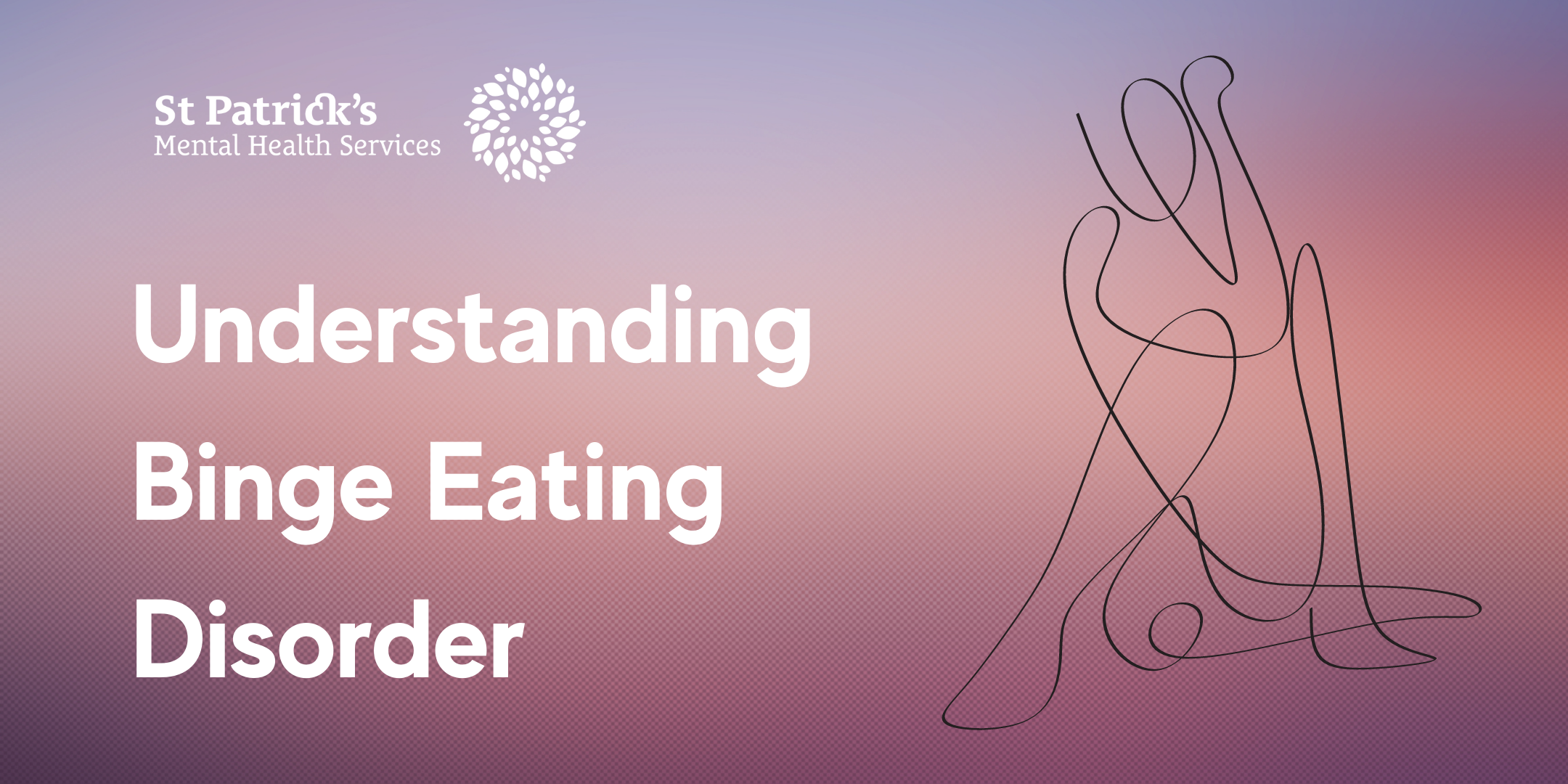
What is binge eating disorder and how can we respond to it? Experts from the Eating Disorders team here at St Patrick’s Mental Health Services (SPMHS) explore.
Binge eating disorder is a mental health condition which is three times more common than anorexia and bulimia combined. Members of our Eating Disorders team give a talk discussing the signs and symptoms of binge eating disorder, as well as the steps a person can take to get support for it, which you can read about and watch back below.
What is binge eating disorder?
Binge eating disorder is a type of eating disorder. Dr Toni O’Connor, Advanced Nurse Practitioner here at SPMHS, explains that people who experience binge eating disorder often define it firstly as a loss of control. Then, to a lesser degree, they describe it as eating large amounts of food and/or eating to ease distress.
The clinical definition of binge eating disorder quite closely matches this personal experience of binge eating disorder. From a clinical perspective, a person may be going through binge eating disorder when they:
- Have recurrent episodes of binge eating
- Experience strong feelings of distress when they binge eat
- Do not try to offset binge eating with behaviours to “make up for” it (called compensatory behaviours).
On average, a person living with binge eating disorder goes through episodes of binge eating at least once a week for three months or more. Feelings of distress accompany their episodes of binge eating and can be very intense. Because the person does not engage in compensatory behaviours, such as vomiting or using laxatives to lose weight or change their body shape, they put on weight.
For many of us, we will have indulged on food at different times, whether that’s eating a lot more than usual over a holiday or snacking while watching films or catching up with friends. This might not always sit with us very well, particularly the next day if we are feeling a sense of regret or if we feel bloated and unwell. It is important to note that there is a difference between these more isolated, short-lived experiences and binge eating disorder.
It is also crucial to note that a person’s weight or appearance is not part of the criteria used to diagnose binge eating disorder. This is especially important to know if you are concerned about someone you know, or if a person is going to a doctor or mental health practitioner for support. The person’s supporters and healthcare professionals should be aware that they may not necessarily be overweight or obese, but may be in the process of putting weight on if the eating disorder continues over time.
See some statistics about binge eating disorder here.
What is binge eating?
An episode of binge eating is characterised by both the following happening together:
- Eating an amount of food that is larger than most people would eat in a certain period of time; this period of time can change from person to person, but has a definite beginning and end
- A sense of not being able to control eating in the period of time, such as feeling unable to stop eating.
A person going through an episode of binge eating will also experience three or more of the following:
- Eating much more quickly than normal
- Eating until they are are uncomfortably full (including to when they get stomach pains)
- Eating large amounts when they are not physically hungry
- Eating alone because of embarrassment at how much they are eating
- Having feelings of disgust, guilt or depression afterwards.
What causes binge eating disorder?
It is difficult to identify any single reason why a person may develop binge eating disorder. There can be many interlinking factors in a person’s life that spark and maintain a condition like this. That’s why it’s important to look at binge eating disorder from a multi-dimensional perspective which includes the
- biological
- psychological
- sociological/environmental and occupational areas of a person’s life.
This is known as a biopsychosocial model. It is very helpful for the person to think about what might be going on in their lives, and enables health professionals to identify an integrated approach to care that considers all aspects of a person’s care.
For the person, these different areas of their lives can come together to create a cycle of binge eating disorder. For example, they can go through a build-up of tension which leads to emotional distress that they find difficult to manage in a healthy way. To cope with the distress, they turn to binge eating, which helps to repress their feelings and release tension – but only for a short time, usually only for as long as they are bingeing or for a short period afterwards. Unintended consequences of shame, guilt, feelings of disgust and hatred then become dominant and stay with them for a long time. They might then make promises to themselves not to binge eat again, but these promises are made in the context of strain and self-criticism, which make their intentions very hard to stick to. Tension builds up and the cycle starts again, with binge eating often happening more often as the cycle continues to repeat itself and intensify.
How is binge eating disorder treated?
Dr O’Connor underlines that recovery from binge eating disorder is possible: there are a number of ways of caring for and treating someone who is going through binge eating disorder, and the earlier treatment begins, the better.
A first point of treatment for binge eating disorder is often an evidence-based, self-help programme – such as the Bodywhys Breaking the Cycle guide – which can be followed at home.
Psychological treatment for binge eating disorder focus on helping the person to understand what’s going on for them and to develop healthier ways of managing distress. Two of the main ways of providing this kind of care include:
- cognitive behavioural therapy for binge eating disorder, which looks at making changes to unhelpful thoughts and actions
- compassion-focused therapy for eating disorders (CFT-E), which focuses on responding to emotions of shame and self-criticism.
Occupational therapy, which explores ways of addressing social and lifestyle concerns, can also be very helpful.
It is important that, while medical management of issues relating to weight and obesity may be needed, treatment for binge eating should not focus on weight loss: this will likely happen naturally as the person goes through psychological treatment and begins their recovery journey.
You can watch a talk back below to learn more about binge eating disorder and taking steps towards recovery. Dr O’Connor covers more on the topics above; Dr Fionnuala McEnery from our Psychology Department explores some of what we can learn about binge eating disorder from CFT-E; and Aleysa Howley from our Occupational Therapy Department looks at how binge eating disorder can impact a person’s self-care, roles and productivity, and leisure, and what can be done to help change this.
Watch more
More information and resources
Continue to…
How climate action and gender equality supports global mental health



